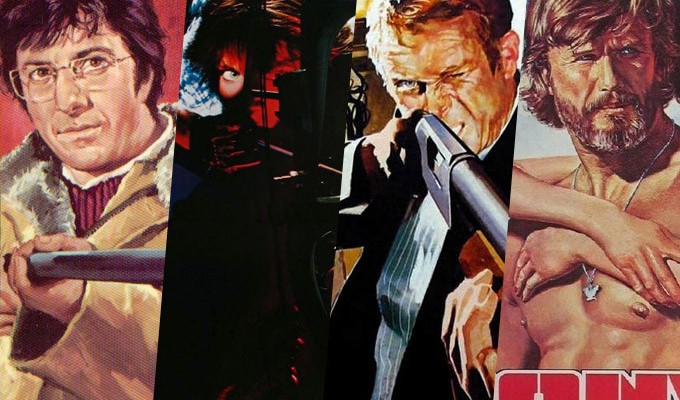“Ride the High Country” (1962)
With script control newly a prerequisite after his frustrations with his debut film, Peckinpah’s next project began with a total overhaul of the script, resulting in “Ride the High Country,” a film that makes overt text of his recurrent subtext about the death of the Old West, and the changing of the guard. Randolph Scott and Joel McCrea, both associated with the Western’s heyday, are aging frenemies Gil and Steve, a crooked conman and a once-respected lawman respectively, both leathery as their saddles in a kind of ’60s “Grumpy Old Western Archetypes”. When Steve is hired to guard a shipment of gold, he enlists his old partner Gil’s help, with both men knowing deep down that Gil, along with his surly young sidekick Heck (Ron Starr) will probably try to steal the payload. But en route Heck falls for Elsa (Mariette Hartley), she ill-advisedly marries the worthless, violent Billy who intends to prostitute her to his brutish brothers, and the parameters of the old timers’ mission change. Suddenly the two men find common ground in Heck and Elsa’s relationship, implying that even fundamental moral and ideological differences can be trumped by the recognition that it is the older generation’s duty to safeguard the younger. It’s tamer and more classic in style than many of Peckinpah’s future films, but there are still some great flourishes, particularly in the unusually sympathetic portrayal of the callow Elsa and the dialogue between the old cowboys. Whether trying to negotiate their differing ethics or joking around about a hole in a boot, there’s a flinty camaraderie between Gil and Steve that gives “Ride the High Country” an appropriately unsentimental yet nostalgic feel. [B-]
“Major Dundee” (1965)
The film that birthed a reputation for being ‘difficult’ that Peckinpah would find it hard to live down after (and sometimes apparently played up to) “Major Dundee” initially debuted to near-universal derision. That reaction is pretty baffling now, as certainly the 2005 136m restored version (there were several cuts) is a grandly ambitious saga of colossal ego and hubris set against the backdrop of the waning months of the American Civil War. Charlton Heston is perfectly cast as Dundee (amusingly, for anyone familiar with “Touch of Evil,” at one point he’s described as making “an unlikely looking Mexican”) whose vendetta against an Indian chief is essentially a recasting of “Moby Dick.” Even-handedly bleak in its “all sides are equally wrong” ethos, it follows Dundee raising a ragtag company of all races, creeds and political persuasions in order to pursue his obsession. Captain Tyreen (a loathsomely urbane Richard Harris) a Confederate prisoner promised pardon if he and his men participate in the possibly suicidal mission, becomes not only Dundee’s reluctant ally, but also his most outspoken antagonist, in love and in war, full of silky, sneering contempt for his former Westpoint colleague’s careerism and pragmatic commitment to the Union cause. Both men tangle with the beautiful Teresa (Senta Berger) but neither does right by her, while Dundee’s demons, in the form of drink and isolation and guilt, multiply. Also starring James Coburn as an Indian scout (which we know because he wears a feather in his hat) and featuring a heady thematic mix of racism, classism and clashing masculinities, “Major Dundee” is a terrifically dense, complex film which enshrines a Peckinpah trademark that doesn’t attract nearly as much comment as his perceived sexism and obsession with violence: his magnificent, imperturbable ambivalence toward the fate of the “great man.” [B+]

“The Wild Bunch” (1969)
If you’ve seen one Peckinpah movie, it’s likely “The Wild Bunch,” the biggest hit of the director’s career and perhaps his film which bears with the most enduring influence. It’s a picture that in large part reinvented the action movie, but its formal innovations aside, what makes it special is the sad, elegiac tone. Rushed into production in an attempt to beat “Butch Cassidy & The Sundance Kid” (which had sold as a script for a record sum), the film saw Peckinpah out to prove himself on the big screen again with the successful Jason Robards-starring TV drama “Noon Wine,” granting him something of a pardon from the director’s jail that “Major Dundee”‘s troubled production and his subsequent firing from “The Cincinatti Kid” had landed him in. “Major Dundee” had proved ahead of its time, but “The Wild Bunch” saw popular taste catching up to Peckinpah, with glowing reviews and solid box office. Set in 1913, the dying days of the Old West, it sees a gang of outlaws led by Pike Bishop (William Holden) forced into stealing a shipment of arms for a Mexican general (Emilio Fernandez), while being pursued by their former colleague Deke (Robert Ryan), now leading a posse of bounty hunters out for their blood. The squib-filled, bloody, slo-mo shootouts, particularly the apocalyptic finale, inspired by “Bonnie & Clyde” and influential on everyone from John Woo to Quentin Tarantino, are the first thing you think of when it comes to the film. But it’s the moments between the action, as portrayed by Peckinpah’s perfect cast (with Ernest Borgnine, Edmond O’Brien, Warren Oates, Ben Johnson and Jaime Sanchez all making huge impressions), that bring the poetry, a dusty, bloody, sad tribute to a kind of life and a kind of person that was gasping its last during at the time and that was long gone by the time the film was made. [A]

